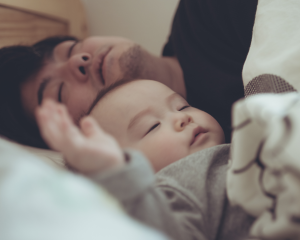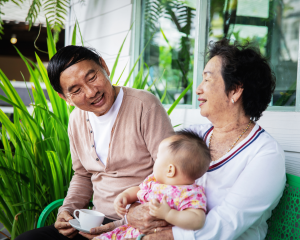“Can you recommend any books for new mums?” an expecting colleague asked me. I gave her the titles of a few books I’d read when my own children were young.
Later, I contemplated how strange it is that Western mothers rely on books to learn about ways of parenting. In many other cultures around the world, parenting practices are passed down from one generation to the next. Parents learn to read the signals and cues from their children, rather than books.
Western society’s ideas of child-rearing are based on encouraging independence. This fits in to our individualist society. Whereas, other cultures have a more ‘collectivist mindset’ and believe building children’s sense of security and attachment will eventually lead to independence.
Although ‘attachment parenting‘ practices have gained an increasingly greater following in the West, we still tend to do things differently. Read on to learn about how we rear our children from a mindset of cultivating self-reliance.
Sleeping in a nursery vs. co sleeping

If I could return to my time as a new mother twelve years ago there are things that I would change. Admittedly, I put my first born into a cot in the nursery from day dot. And yes, my husband and I tried the old ‘cry it out’ method. It didn’t feel natural to listen to my baby’s cries. Instead of listening to my instincts I followed the reasoning and sleep training advice I had read in a book. All in the name of building my baby’s independence.
These days it is more common for babies to sleep in cots or bassinets next to their parents bed for at least the first 6 months. But after this period, babies are generally put in a nursery to sleep alone.
By contrast, the vast majority of mothers in non-Western societies around the world co-sleep with their babies. They do so until they are weaned and even long afterwards. There are a variety of ways that parents co-sleep with their children. In the Philippines, Vietnam and Latin America babies are placed in a hammock next to the bed or in a wicker basket in the middle of the bed between the two parents. Many Japanese parents sleep beside their babies on futons or bamboo mats on the floor. Bed sharing is a strong tradition in India, with families sleeping in the same beds for years.
Prams and baby capsules vs babywearing
There is no doubt that pushing a pram around the shops, or transferring a baby by car capsule are convenient modes of transport. It does seem strange though, that a baby who has been a part of their mother’s body is suddenly separated from them.

In non-Western cultures baby wearing is more the norm. Whilst we have increasingly adopted babywearing over the past twenty years, it has been the traditional way to transport infants around the world for thousands of years. Babywearing techniques vary from Mexico to Mozambique and include slings, wrapping the child on the chest or back and attaching them to the side with baskets. Mothers often carry their infants this way so that they can keep their babies safe while they do work such as weaving or harvesting.
Although we may not have the safety concerns or physical workloads of parents in low income countries, babywearing does promote mutual bonding and provides an instant calming effect.
When my second child was a newborn, every time I put her down she would cry, including in the pram. By then I was more in tune with my mothering instincts and ignored the advice espoused by a well-meaning neighbour, “If you keep picking up your baby every time she cries, you’re going to spoil her.” I put her in a baby sling and as soon as she was cradled inside she would settle and go off to sleep.
Raising a child individually vs collectively

We have all heard the adage “It takes a village to raise a child”. In many Western countries we do not live in communities as we once did. Families very rarely co-habitat between generations. First-time parents are usually on their own.
My husband and I certainly had to figure things out for ourselves as both sets of our parents lived thousands of kilometres away. We may have been able to do things ‘our’ way but there were times when I would have loved some family support.
On the other hand, living in a multi-generational household is a common practice in Africa and Asia. Africans have a tradition of collective responsibility for children, which means that children are cared for by extended family or tribes. If needed, mothers will breastfeed children who are not their own. New parents have an instant support network of aunties, grandmothers and elders to call upon for advice and childcare.
In Asian countries like China and Vietnam, co-parenting with grandparents is a widespread occurrence. A number of recent studies of families in several Asian countries found that having the support, role modelling and encouragement can help new mothers to feel more confident in their parenting role.
While Western parents may do things differently, it’s not to say that these practices are necessarily right or wrong. There is great diversity in parenting across the world. This reflects the varying economies, lifestyles and values of different countries and cultures. What it all comes down to is parents finding what works best for their family. For me, that meant tuning out what others were saying or doing and tuning in to my children’s needs.


0 Comments